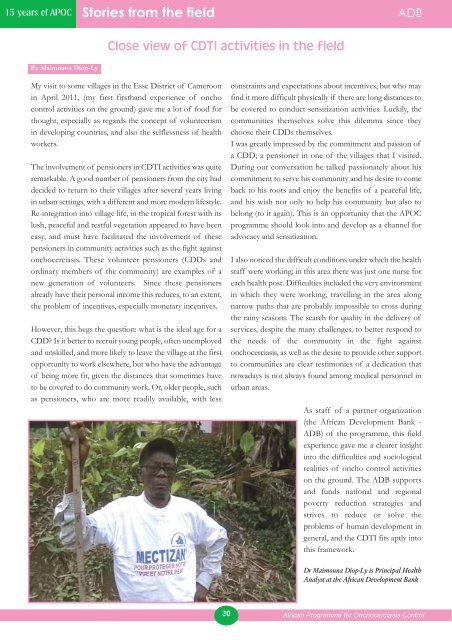15 years of APOC - World Health Organization
15 years of APOC - World Health Organization
15 years of APOC - World Health Organization
You also want an ePaper? Increase the reach of your titles
YUMPU automatically turns print PDFs into web optimized ePapers that Google loves.
<strong>15</strong> <strong>years</strong> <strong>of</strong> <strong>APOC</strong><br />
By Maimouna Diop-Ly<br />
Stories from the field ADB<br />
Close view <strong>of</strong> CDTI activities in the field<br />
My visit to some villages in the Esse District <strong>of</strong> Cameroon<br />
in April 2011, (my first firsthand experience <strong>of</strong> oncho<br />
control activities on the ground) gave me a lot <strong>of</strong> food for<br />
thought, especially as regards the concept <strong>of</strong> volunteerism<br />
in developing countries, and also the selflessness <strong>of</strong> health<br />
workers.<br />
The involvement <strong>of</strong> pensioners in CDTI activities was quite<br />
remarkable. A good number <strong>of</strong> pensioners from the city had<br />
decided to return to their villages after several <strong>years</strong> living<br />
in urban settings, with a different and more modern lifestyle.<br />
Re-integration into village life, in the tropical forest with its<br />
lush, peaceful and restful vegetation appeared to have been<br />
easy, and must have facilitated the involvement <strong>of</strong> these<br />
pensioners in community activities such as the fight against<br />
onchocerciasis. These volunteer pensioners (CDDs and<br />
ordinary members <strong>of</strong> the community) are examples <strong>of</strong> a<br />
new generation <strong>of</strong> volunteers. Since these pensioners<br />
already have their personal income this reduces, to an extent,<br />
the problem <strong>of</strong> incentives, especially monetary incentives.<br />
However, this begs the question: what is the ideal age for a<br />
CDD? Is it better to recruit young people, <strong>of</strong>ten unemployed<br />
and unskilled, and more likely to leave the village at the first<br />
opportunity to work elsewhere, but who have the advantage<br />
<strong>of</strong> being more fit, given the distances that sometimes have<br />
to be covered to do community work. Or, older people, such<br />
as pensioners, who are more readily available, with less<br />
30<br />
constraints and expectations about incentives, but who may<br />
find it more difficult physically if there are long distances to<br />
be covered to conduct sensitization activities. Luckily, the<br />
communities themselves solve this dilemma since they<br />
choose their CDDs themselves.<br />
I was greatly impressed by the commitment and passion <strong>of</strong><br />
a CDD; a pensioner in one <strong>of</strong> the villages that I visited.<br />
During our conversation he talked passionately about his<br />
commitment to serve his community and his desire to come<br />
back to his roots and enjoy the benefits <strong>of</strong> a peaceful life,<br />
and his wish not only to help his community but also to<br />
belong (to it again). This is an opportunity that the <strong>APOC</strong><br />
programme should look into and develop as a channel for<br />
advocacy and sensitization.<br />
I also noticed the difficult conditions under which the health<br />
staff were working; in this area there was just one nurse for<br />
each health post. Difficulties included the very environment<br />
in which they were working, travelling in the area along<br />
narrow paths that are probably impossible to cross during<br />
the rainy seasons. The search for quality in the delivery <strong>of</strong><br />
services, despite the many challenges, to better respond to<br />
the needs <strong>of</strong> the community in the fight against<br />
onchocerciasis, as well as the desire to provide other support<br />
to communities are clear testimonies <strong>of</strong> a dedication that<br />
nowadays is not always found among medical personnel in<br />
urban areas.<br />
As staff <strong>of</strong> a partner organization<br />
(the African Development Bank -<br />
ADB) <strong>of</strong> the programme, this field<br />
experience gave me a clearer insight<br />
into the difficulties and sociological<br />
realities <strong>of</strong> oncho control activities<br />
on the ground. The ADB supports<br />
and funds national and regional<br />
poverty reduction strategies and<br />
strives to reduce or solve the<br />
problems <strong>of</strong> human development in<br />
general, and the CDTI fits aptly into<br />
this framework.<br />
Dr Maimouna Diop-Ly is Principal <strong>Health</strong><br />
Analyst at the African Development Bank<br />
African Programme for Onchocerciasis Control

















